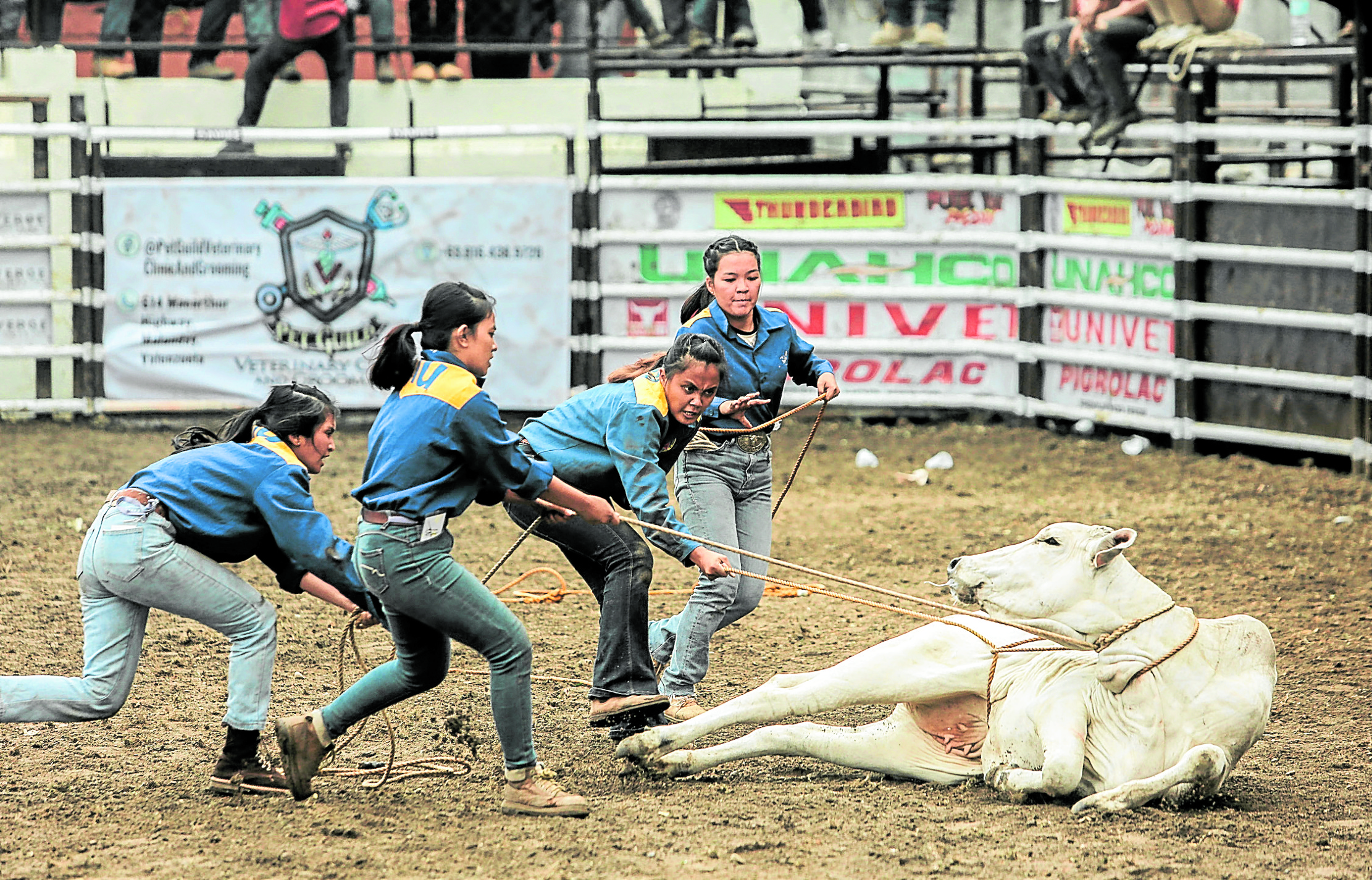Masbate rodeo gets bigger, but defended anew vs critics

BACK IN THE ARENA After a three-year pause, the Masbate Rodeo Festival is back with seven events meant to showcase the skills of local cowboys and cowgirls. The organizers, however, still see the need to explain that the event is governed by strict rules and may hardly be considered sanctioned cruelty or abuse, as animal welfare advocates put it. PHOTO BY MARK ALVIC ESPLANA
MASBATE CITY, Philippines — With a record number of contestants this year, the annual rodeo festival pushed on as a major tourism draw here despite continuing criticism from animal welfare advocates.
Seven events—bull riding, two-man carambola, steer wrestling, lasso wrestle tie, load carry relay, cast-down, and four-man Carambola—made up the Philippine Rodeo Finals organized by the Rodeo Masbate Inc. (RMI) and which ran from April 9 to April 13.
Critics have been denouncing the festival since the first staging in 1993 as glorified animal cruelty and sanctioned abuse.
More stringent
But organizers maintain that the competition guidelines are actually more stringent than the provisions applicable to rodeos under Republic Act No. 8485, or the Animal Welfare Act of 1998.
For Trece Leo Gozum, the rodeo finals director, they should continue to be viewed as livestock or draft animals, not pets, in such a setting.
Article continues after this advertisementShowcase of skills
The event is still about showcasing the skills of the local cowboys, ranch workers or cowhands, Gozum said, as they are “getting quicker, faster and more scientific.”
Article continues after this advertisement“They are all well-trained. They grew up in this kind of work,” Gozum said in an interview on Friday.
The 22 cowhands tapped for the festival, those who are not competing but were tasked with handling the animals, are mindful of the criticisms that’s why they act with extra care, he added.
During the competitions, however, one cowhand was seen kicking a cow in the face when the animal did not immediately stand up after being untied. The Inquirer saw other cows being kicked in the body to force them down the passageways leading in and out of the arena.
Positive sign
But Gozum explained that the cowhands were wearing soft boots and that they were just trying to make the animals move.
This year, a total of 63 teams from all over the country initially signed up for the Philippine Rodeo Finals, a record for the RMI.
The organizers had to trim the list down to a more manageable field of 44 teams under three categories: professional (12 teams), male students (18) and female students (14).
The cash prizes range from P60,000 (for overall team winner) to P5,000.
Gozum took the high number of participants as a positive sign that the activity—the idea of working on cattle farms and in the agriculture sector in general—continues to enjoy a measure of public appeal.
When conceived more than three decades ago, the festival sought to reinvigorate the “dying” cattle industry in the island province.
More grounded
When RA 8485 was being drafted, Gozum was one of the consultants approached for the bill, particularly on the cattle sector.
When the law was finally enacted, its implementing rules and regulations (IRR) had portions specific to the conduct of rodeos. Gozum later invited the writers of the IRR to see the conduct of the Masbate rodeo for themselves, and showed them the regulations he drew up for the competitions and the handling of animals.
“When they read them, (they saw that) my rules are more strict than the IRR. The rules here are more grounded than the law,” he recalled. “And so they ended up asking: ‘Why didn’t we use this?’”
Extra attention
Critics who continue to disparage the annual rodeo may change their minds if they immerse themselves in the life of cattle-raisers, Gozum said.
“They need to be exposed more. They need to see the real world. They need to come over and check what we’re doing and see how things must be done,” he said.
For their well-being, cattle used in the competitions are given extra attention for about a week after the rodeo, Gozum said.
They are examined by “volunteer veterinarians,’’ given antistress vitamins, and are dewormed, he added.